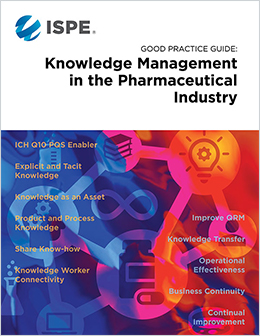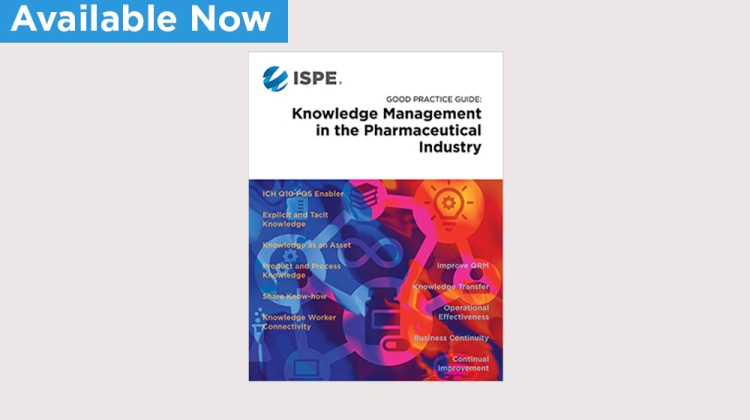1. What is Knowledge Management?
 Kane: Knowledge Management (KM) is a discipline (akin to Quality Risk Management, QRM, or Lean Six Sigma) that focuses on how organizations create, manage, use, and share knowledge.
Kane: Knowledge Management (KM) is a discipline (akin to Quality Risk Management, QRM, or Lean Six Sigma) that focuses on how organizations create, manage, use, and share knowledge.
The publication of ICH Q10 in 2008 saw the formal designation of KM as a key enabler for an effective Pharmaceutical Quality System, along with QRM. Since then, the industry has acknowledged the importance of managing knowledge across the lifecycle to enhance process understanding, improve decision making, and enable more robust risk management. ICH Q10 and the more recent ICH Q12 discuss the expectations for organizations to proactively manage product and process knowledge citing the potential of more efficient and effective regulatory oversight (e.g. ICH Q12). There are currently few resources, and no industry guidance available which address the role of Knowledge Management specifically for the pharmaceutical industry.
2. How can pharmaceutical and life science companies benefit from developing a Knowledge Management program?
Adams: Employing KM methods and tools enables organizations to better manage their knowledge as key asset, in turn improving the effectiveness of the pharmaceutical quality system, providing operational benefits. Some examples of benefits of when knowledge is managed as an asset include taking the waste out of time to find knowledge, better decision making, better utilization of tacit knowledge, and improving Right First Time (RFT) expectations.
3. How will this Guide help companies incorporate Knowledge Management into their daily operations?
Kane: This is the first industry guidance to address the role of Knowledge Management specifically for the pharmaceutical industry. This guide works to demystify KM and provides practical guidance, templates, case studies, and references to related ISPE industry guidance (e.g. technology transfer) to help organizations better understand what KM is, the benefits of effective KM, and how to deploy KM.
4. What are some of the key takeaways from this Guide?
Adams: An important theme throughout this Guide is the emphasis on tacit knowledge. Given the regulated and document-centric nature of the pharmaceutical industry, the importance and impact of tacit knowledge is arguably underappreciated. This Guide aims to highlight this, and where appropriate, provide KM methods and tools to better recognize, capture, transfer, and apply tacit knowledge.
Other key takeaways include:
- Emphasis on Technology Transfer, including references to the ISPE Good Practice Guide: Technology Transfer
- Linkages to ISPE PQLI Guides
- Exploring the relationship between KM and QRM
- Relating this Guide to the ISO standard for KM, ISO 30401
- The importance of Organizational Change Management
- A collection of KM methods and tools
5. How will this Guide be useful to others in the industry?
Kane: This Guide seeks to embrace and advance the topic of KM for the pharmaceutical industry.
The goals of this Guide are to:
- Define and explore the meaning and importance of KM in the context of the pharmaceutical industry
- Discuss the importance of KM to the PQS (Pharmaceutical Quality System)
- Describe KM principles, key concepts, the general KM process, and foundational KM methods and tools
- Discuss forward looking opportunities for KM
- Share practical pharmaceutical applications and case studies of KM
The practical principles, methods, and tools provided in this Guide are intended to help organizations improve their capabilities in managing knowledge and using that knowledge to support an effective PQS resulting in improved PQS outcomes (e.g., better risk-based decision making) and operational performance, among other benefits.
Buy Now!







